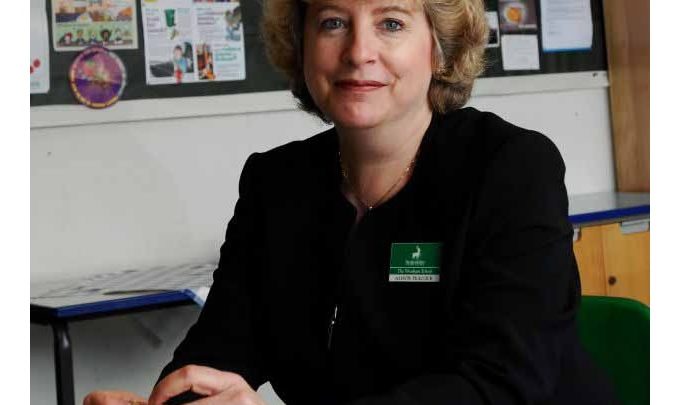“I’m Not In Favour Of Beating People Up And Telling Them What’s Wrong With Them”

Dame Alison Peacock tells us what makes an effective leader – and explains why life without levels is a change for the better…

Dame Alison Peacock is executive headteacher at The Wroxham School. A noted education researcher and consultant, she was awarded a DBE in 2014 for services to education and is a regular guest speaker at various events and conferences.
We caught up with her at TEDx NorwichED to discuss her talk on ‘Learning Without Limits’, and why doing away with levels was a disruptive, but ultimately good things to do…
In your TEDx talk you discussed the story of Miles – a child from a foster family who went from attending special school, to thriving in a mainstream secondary after switching in Y5. How often have you encountered children like Miles in the course of your career? There are lots of stories I could share – a few about children who have some kind of difficulty in learning, but also many about children who might otherwise have been overlooked.
During my first headship, a parent complained to me that her daughter, Rebecca, was not being sufficiently challenged in class. She had been placed in the bottom group; the teacher of that class – who was the only teacher I had to move on in the time I was there – was replaced by a new teacher, who proceeded to teach the class and this girl for the next two years. Rebecca really thrived in his classroom, and some years later in 2014, she became Young Engineer of the Year at Imperial College.
It’s about helping high aspiration children, as well as children with additional needs – it’s about every child. Any teacher can think of children they’ve taught in the past, or who they’re teaching now, where they’re constantly thinking, ‘How do I find the way through to this child?‘
The crucial thing is not asking ‘What’s wrong with them?’, but ‘How can we find a way through?’ ‘What can we do differently to enable them to thrive?
What prompted you to switch from secondary to primary teaching? I trained as a primary teacher and moved into secondary, but when I had my own daughters I realised that learning happens so fast when you’re little. It’s such an exciting time, and that gave me the feeling – ‘I am going to go back into primary.’
I now do a lot of conference speaking, I work with adults, and it’s all the same – whether you’re working with 17-year-olds or 2-year-olds or professors, learning is learning and teaching is teaching.
You’re known for dramatically turning round a primary school that had previously been in special measures – of the lessons you’d learned up to then, which ones helped you the most when taking on that headship? The biggest influence on my life aside from family has been constant professional learning. I completed my Masters at Cambridge and did lots of reading. I have educational heroes, such as John Dewey and Susan Isaacs – but also people like Robin Alexander, who one reads about and thinks ‘Wow, I wish I could do the kind of work they do‘.
For me, it’s a constant quest to always find out more. I’m constantly thinking, ‘Who can I learn more from?’ ‘What else can we do?’ ‘How else can we help?’
I’ve spent time since then working with other school leaders to empower and enable them in a climate that’s often quite brutal. I explain to them that if we connect with the first principles of what really matters (the children) and enable their teachers to teach as well as they possibly can – which is usually through encouragement and not criticism – that’s how things will start to move in the right direction.
I’m not in favour of beating people up and telling them what’s wrong with them. Occasionally you’ll come across a colleague who really isn’t in the right job, such as the teacher I referred to earlier, but they’re very much in the minority. I’d say the vast majority of teachers want to do as well as they can – and in my view, it’s the job of school leaders to be lead learners and help them to flourish, rather than make them feel that they’ve got to tick boxes and constantly prove themselves.
In your experience, are teachers better able now to realise children’s aspirations, or are there more barriers getting in the way of that? Taking away levels was a very brave and clever move – a deliberately disruptive move on the part of government, but one that’s meant colleagues are now having to think about assessment for the first time; to really think of themselves as assessors, rather relying on someone else.
Teachers have tended to think of assessment as something wrapped in plastic that arrives at your school; you just unwrap it and follow the instructions of someone else who knows best. When you’re a good teacher, assessment is actually something you do all the time. I was on the Commission for Assessment Without Levels, and I think the recommendations from that have been broadly welcomed.
I’ve since started an initiative with others in response to those recommendations – the DfE is promoting self-led systems, so let’s do it for ourselves. We’ve got a conference coming up in May, where we’ll be gathering everybody together and asking, ‘How are we coping in assessment?’ ‘What do we need to do?’ ‘How can we approach commercial providers, and can they provide something that makes this better for us?’
It’s not going to be focused on tracking. It’ll be about asking ourselves what we know about assessing learning effectively. Teachers want to do the best they can do. They don’t want to be left in the wilderness, and they want to connect – so I feel quite optimistic.
For more information, visit alisonpeacock.net or follow @AlisonMPeacock











